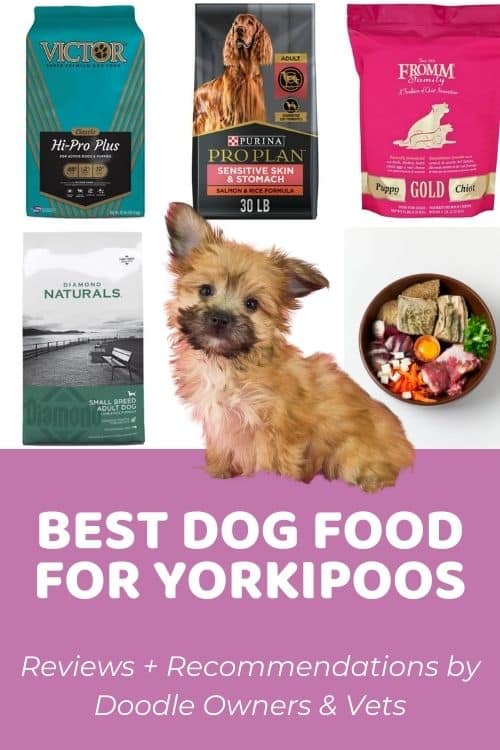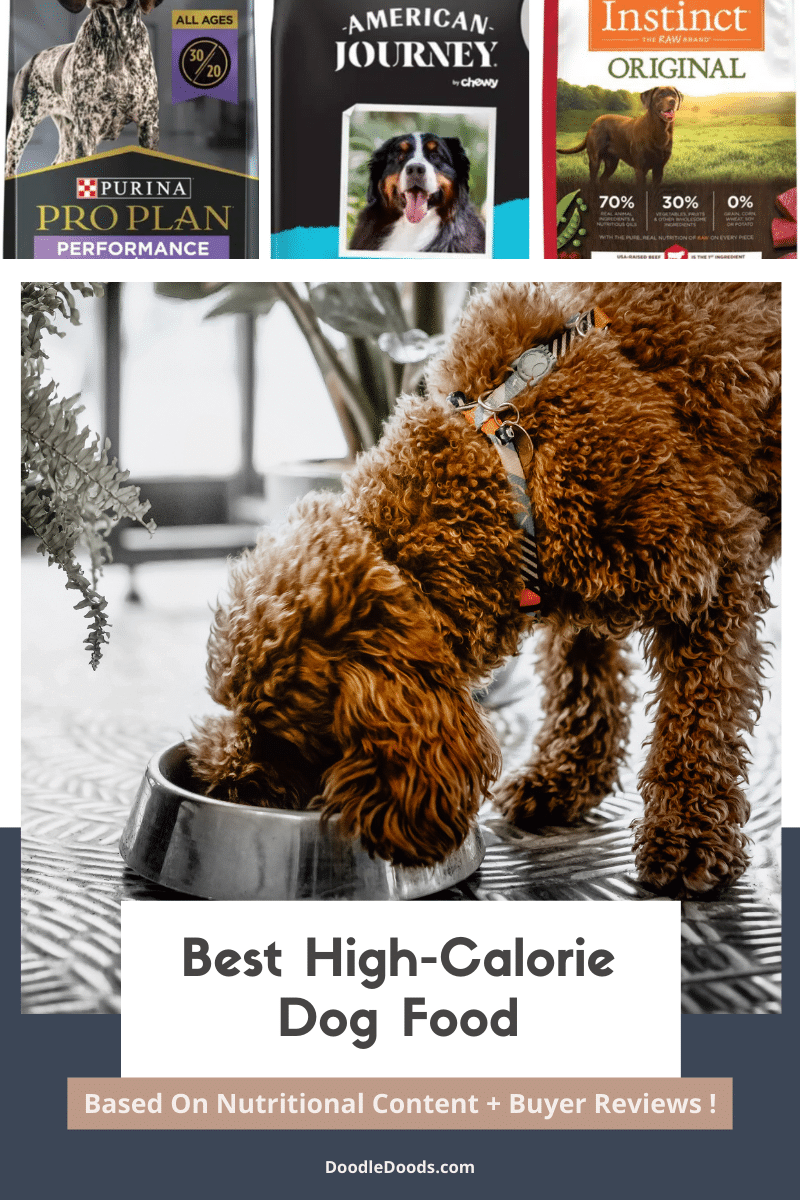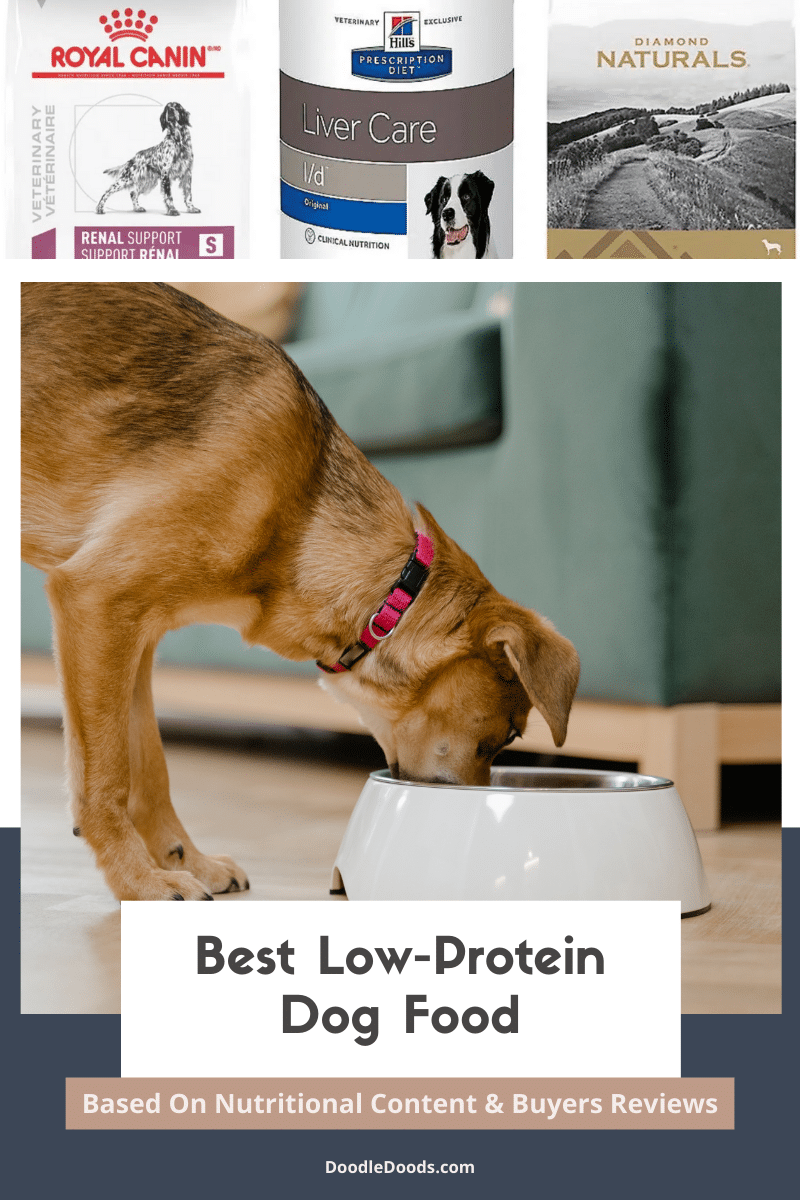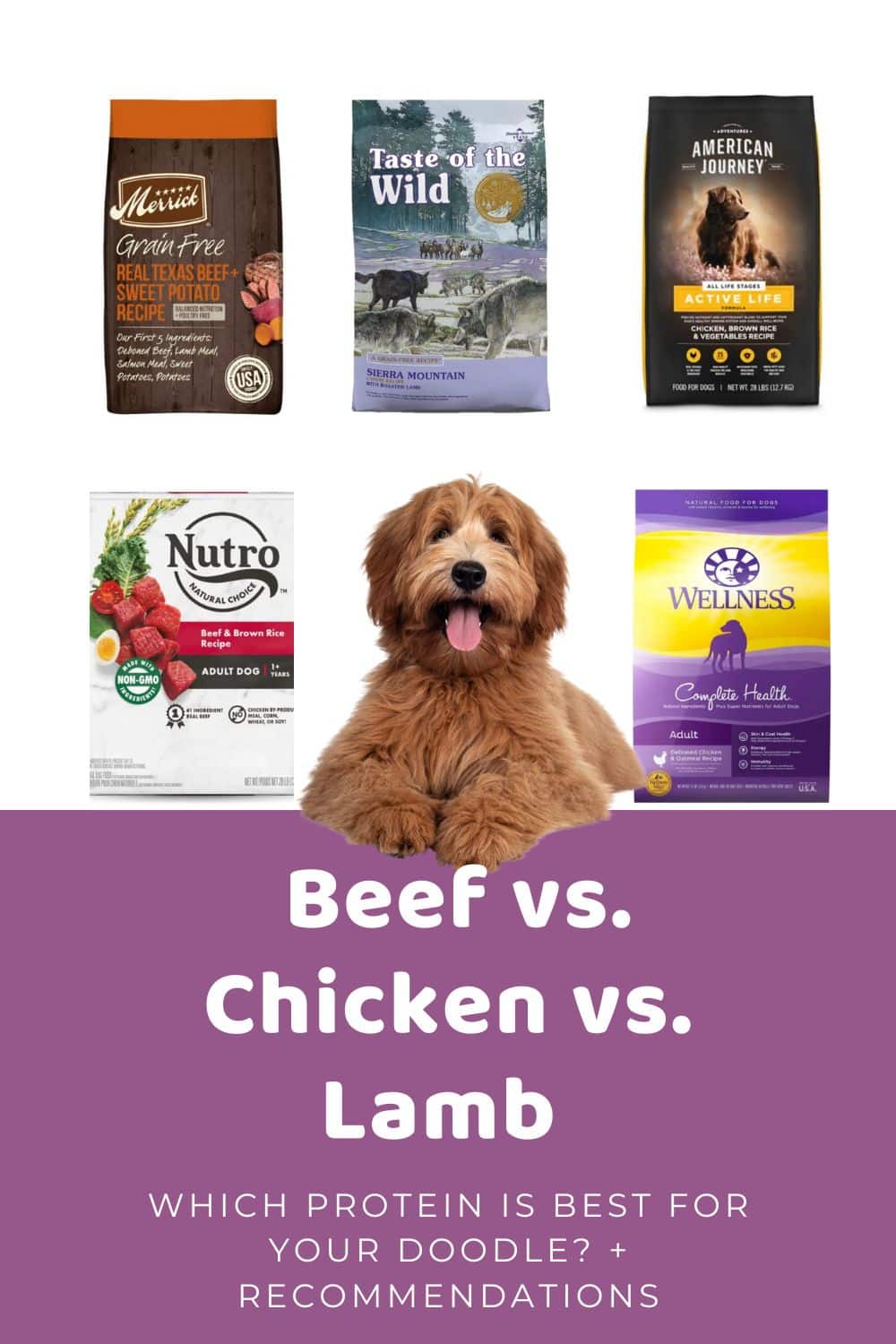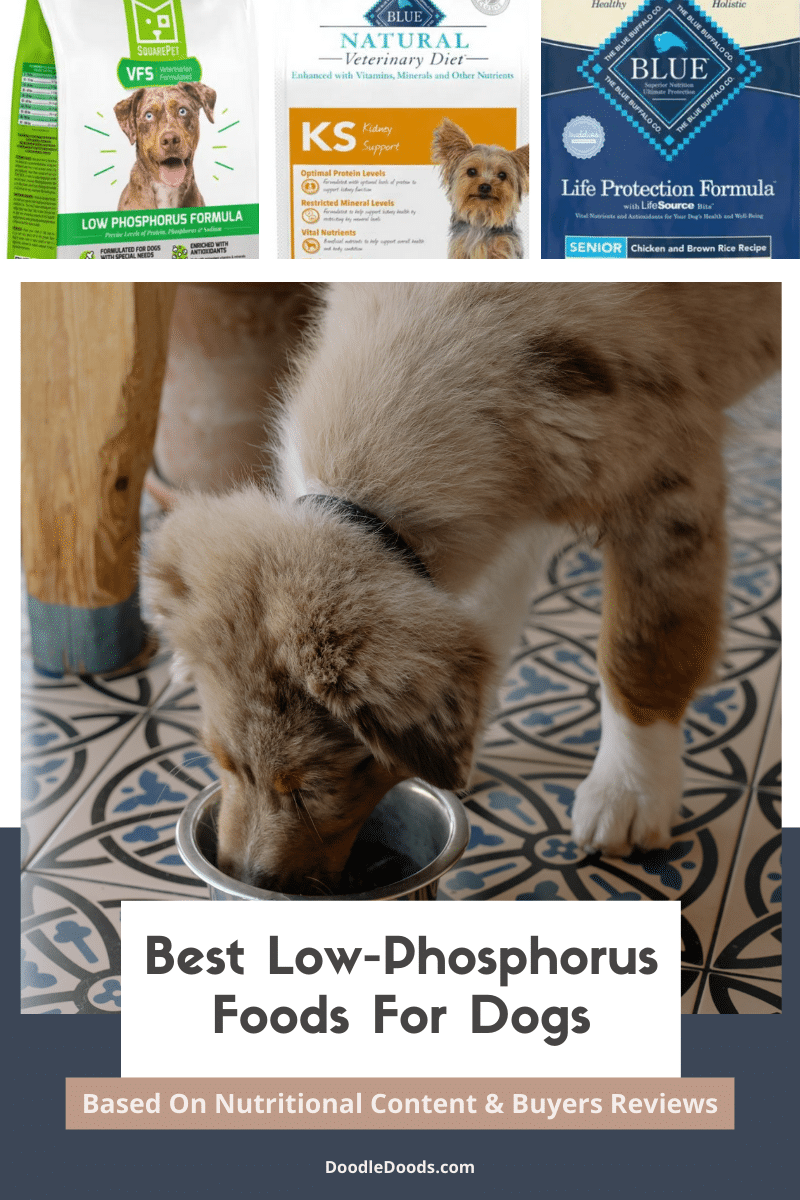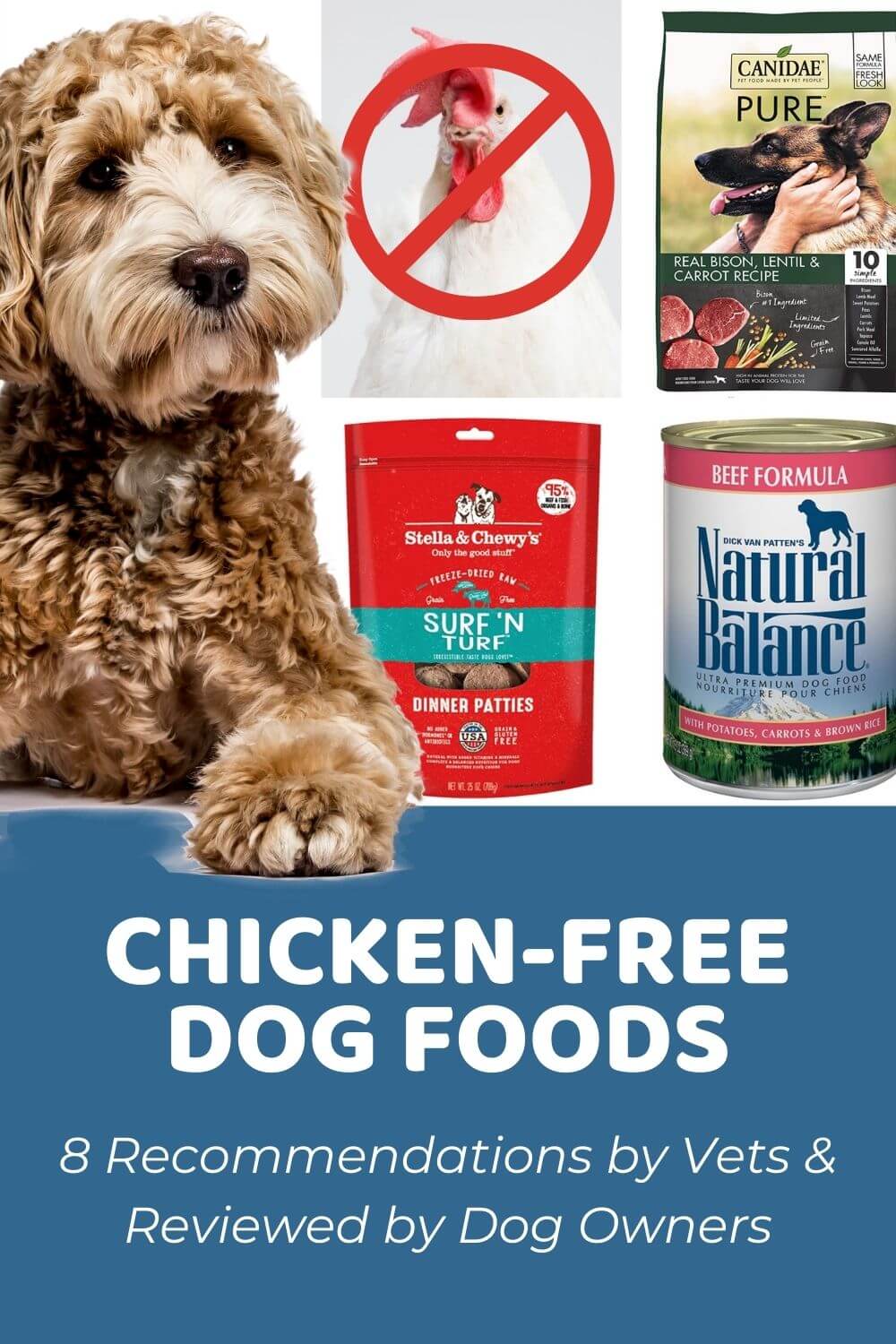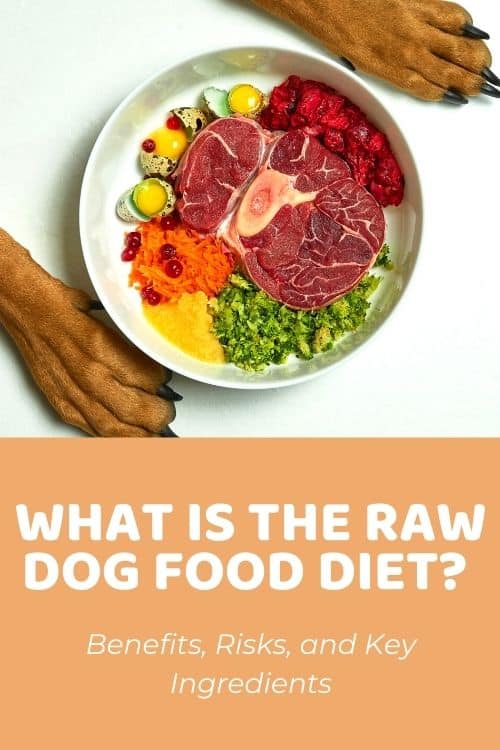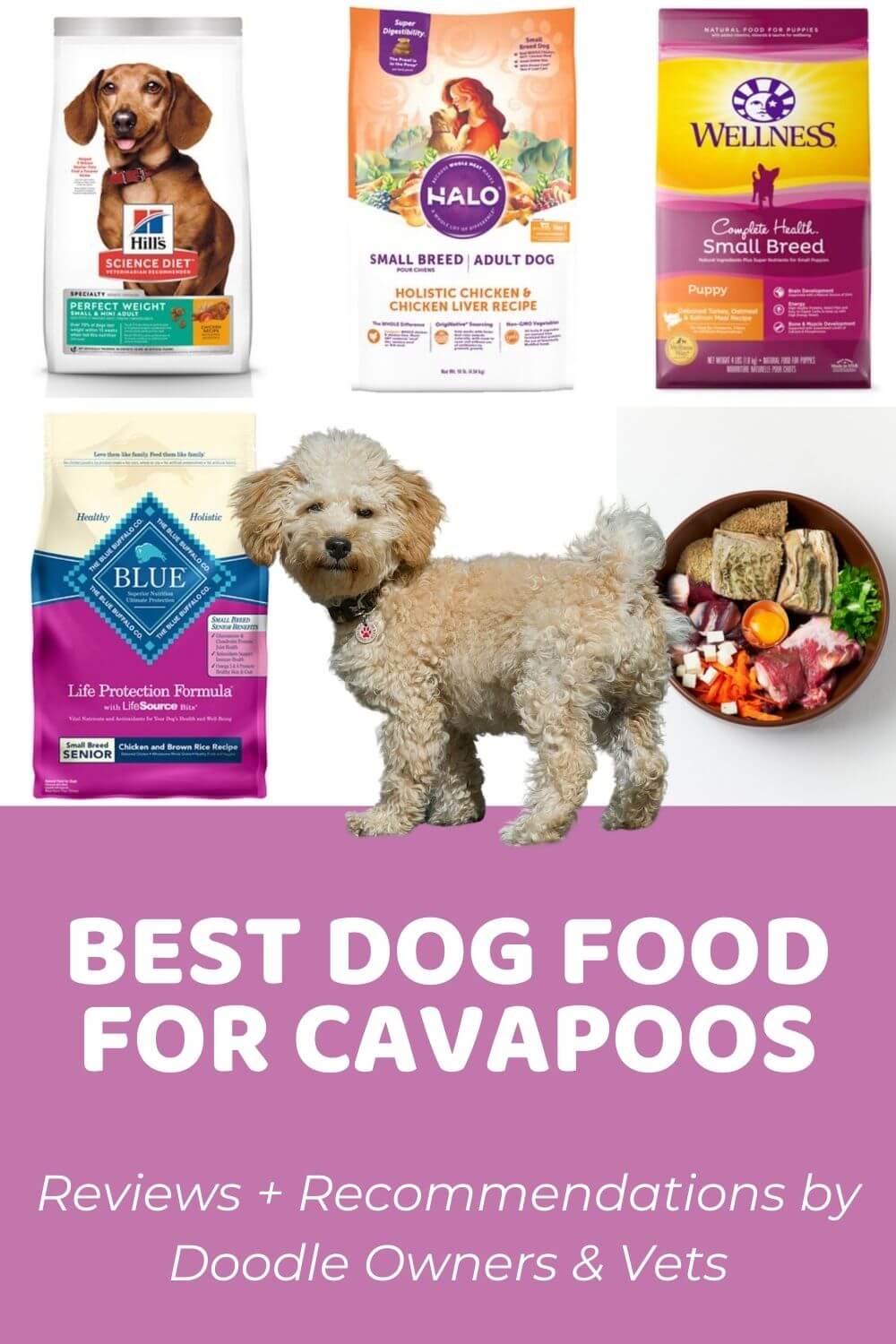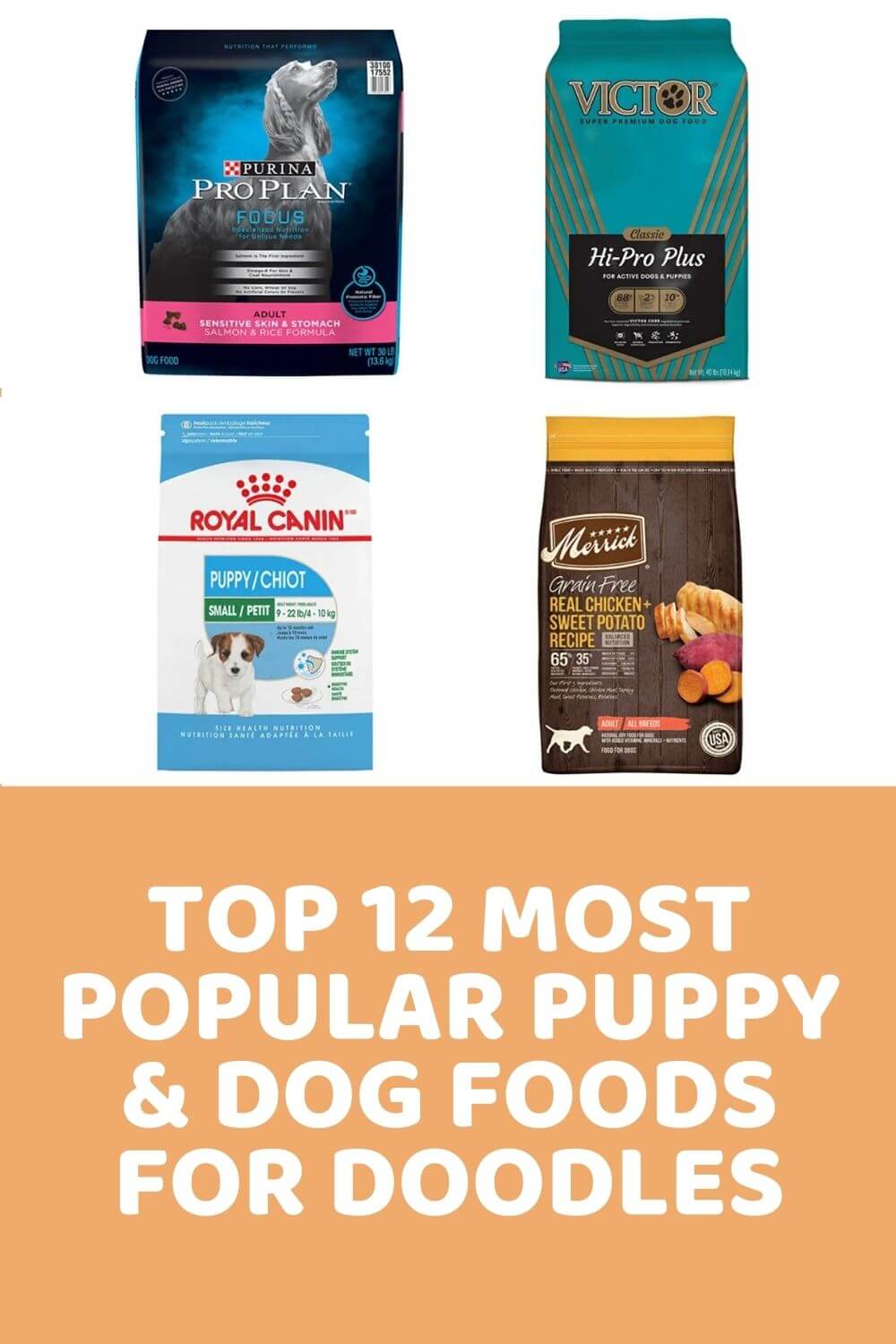Choosing the best food for Yorkipoo is understandably not the easiest of tasks. With so many options on the market, which one should you choose? In this article, we’re going to talk about the key nutritional needs of the Yorkipoo, and how certain foods can help with common Yorkipoo health concerns. We’ll also be reviewing the top 8 best dog food for Yorkipoo that their owners absolutely swear by. Let’s get started!
Table of Contents
- What To Look For In Yorkipoo Food?
- Common Health Issues Of Yorkie Poos & How Foods Can Help Them
- Top 8 Best Dog Food For Yorkipoos: Reviews
- Yorkie Poo Feeding Chart
- Best Food For Yorkipoo: FAQs
Our Top 5 Best Dog Food For Yorkipoo
Before we jump into the Yorkipoo diet requirements and review the most popular formulas, here’s a quick overview of the best food for Yorkipoo that dogs can’t get enough of:
-
Pick #1:
Purina Pro Plan Adult Sensitive Skin & Stomach dry dog food formula is perfect for those Yorkipoos who need some extra tummy support.
-
Pick #2:
Fromm Puppy Gold dry formula uses all the best natural ingredients to nourish puppies and pregnant or nursing mamas.
-
Pick #3:
Victor Classic Hi-Pro Plus dry formula is the safest bet for super energetic Yorkipoos.
-
Pick #4:
Hill’s Science Diet Adult Sensitive Stomach & Skin formula is recommended by veterinarians and Doodle owners alike.
-
Pick #5:
Royal Canin Veterinary Diet Hydrolyzed Protein Adult HP dry kibble is a veterinary-exclusive prescription formula for puppies and adult Yorkipoos with food sensitivities.
What To Look For In Yorkipoo Food?
As you might know, the endless dog food options available on the market can really hinder your decision making process. Not all formulas work equally great on all dogs. And not all formulas are the same, either. When choosing the best food for Yorkipoo, look for formulas that have a balanced nutrient profile and include real, quality ingredients. The packaging should include the statement that it meets the Dog Food Nutrient Profiles established by the AAFCO.
Of course, you can always discuss the best option with your vet, as they have a proper overview of your Yorkipoo’s health and any possible conditions. Additionally, small Doodles like the Yorkipoo might do better on a formula that’s specially designed for small breeds. Toy-sized breeds like the Yorkipoo are more prone to digestive issues. Formulas that are made for small dogs typically contain lots of tummy soothing probiotics, prebiotics, and fiber.
Key Nutritional Needs Of Yorkie Poos
A good diet for a Yorkipoo should consist of a variety of micro and macronutrients. Macronutrients protein, fat, and carbs fuel your pup’s daily energy requirements. The most common types of protein sources used in dog foods are chicken, beef, and different types of fish. However, many brands have started to offer more variety by also using other meats like duck, rabbit, or venison. The AAFCO states that puppies and adults need at least 22% and 18% of protein in their diet, respectively.
As for the carbs, you’ll be able to find either grain-inclusive or grain-free dog food formulas. The most common types of carbohydrates in dog food are wheat, rice, oats, barley, potatoes, and sweet potatoes. We recommend you look for formulas that use whole grains, as they contain more nutrients and fiber.
The third macronutrient that’s a key player in many functions in your dog’s body is fat. Fatty fish like salmon, or added flaxseeds and fish meal all provide plenty of essential fatty acids that your dog needs. By the AAFCO standards, adults should get at least 5% of fat from their diet while puppies would need at least 8% of fat.
Meanwhile, micronutrients like vitamins A, B, C, D, E, K, and minerals like magnesium, zinc, calcium, potassium will provide your Doodle all the essential nutrients it needs for their normal body function.
Common Health Issues Of Yorkie Poos & How Foods Can Help Them
What to feed a Yorkipoo who is at risk of developing certain health conditions? Although Yorkipoos tend to be healthier than the purebred parent pups, there’s still a chance that a puppy might develop certain health problems throughout their life. Let’s take a look at the most common Yorkipoo health issues and how certain foods and supplements can help prevent or manage them.
Allergies & Sensitivities
Like many other Doodles, Yorkipoos can often struggle with skin and stomach sensitivities. Typically, the triggers are high protein ingredients, and the symptoms can either manifest on the skin as itching and rashes, or affect the dog’s digestion.
Most commonly, Yorkipoo allergies are triggered by chicken, wheat, dairy, eggs, beef, soy, or fish. In case your dog struggles with allergies or sensitivities, your vet might recommend you to cut out certain foods from your pup’s diet.
In addition, as tiny dogs like the Yorkipoo are prone to digestive issues, look for formulas that contain lots of fiber, probiotics, and prebiotics.
Eye Problems
Yorkipoos can develop eye problems like dry eye, cataracts, progressive retinal atrophy (PRA), lens luxation, or retinal dysplasia. Many of them have a progressive nature so leaving them untreated can cause blindness. If you’re looking to add some targeted eye care to your Yorkipoo’s diet, opt for dog food formulas containing plenty of vitamin A, antioxidants, carotenoids, and essential fatty acids. The ingredient list should include lots of fruits and veggies that are all packed with eye supporting nutrients.
Endocrine Problems
Endocrine disorders like hypothyroidism, Cushing’s disease, Addison’s disease, and diabetes are all related to hormonal imbalances. Most often, they’re hereditary and cannot be prevented with certain foods. Nevertheless, your pup will surely feel much better when you feed them a healthy diet that takes into account their unique needs.
Joint Problems
As the Yorkipoo is a toy-sized dog, they are at a risk of developing joint problems like arthritis, hip dysplasia, elbow dysplasia, Legg-Calvé Perthes disease, or patellar luxation. What’s common with all of those diseases is that they cause inflammation, swelling, and pain. Naturally, if your dog feels pain, they are less likely to get up and move. As a result, your dog might become overweight, which in turn puts even more pressure on the joints.
The best supplements that support joint health are glucosamine and chondroitin. Both of these compounds help repair damaged cartilage and reduce the pain. Also, healthy fats and added fatty acids are amazing for reducing inflammation and pain in joints.
Obesity
In addition to being a potential risk to the joints, obesity can drastically affect your dog’s overall life quality. If your Yorkipoo is struggling to maintain a healthy weight, look for formulas that are either specially tailored for weight management, or don’t contain too much fat. It’s also especially important that you stick to a proper feeding schedule and do not overfeed your dog.
Top 8 Best Dog Food For Yorkipoos: Reviews
Purina Pro Plan
This Purina Pro Plan formula is great for Yorkipoos who struggle with skin and tummy sensitivities. It’s made with salmon and rice, which are both great alternatives for pups who have to cut out the most common triggers – chicken and wheat. In addition, this dry kibble is fortified with live probiotics and prebiotic fiber to provide a targeted support for your Yorkipoo’s digestion. For instance, chicory root is an excellent natural source of fiber.
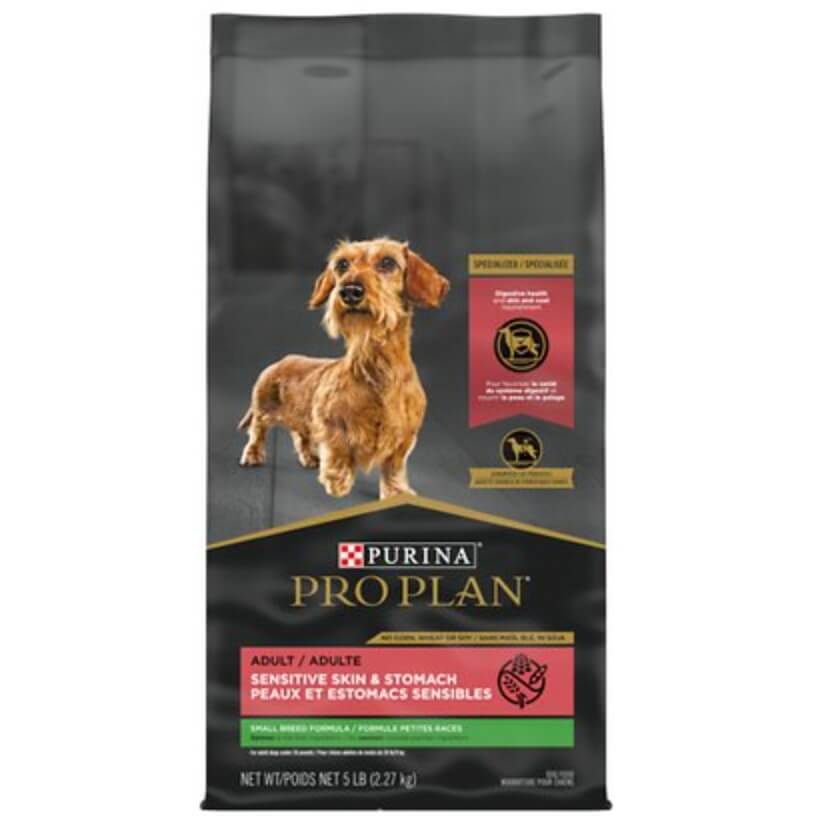
What we love about this formula is that the first ingredient listed is salmon. This means that your Doodle gets all of those essential fatty acids, which support the skin, coat, eye, and joint health.
What’s more, the ingredient list includes glucosamine from both fish meal and salmon meal. As we mentioned above, glucosamine is super beneficial for joint health and mobility. Additionally, the formula contains vitamins A and E, along with fish oil that contribute to a healthy vision.
Pros
- Great choice for Yorkipoos with sensitivities.
- Contains plenty of omega-3 and omega-6 fatty acids.
- Glucosamine for joint support.
- Additional vitamins and supplements for eye support.
Cons
- This formula is higher in calories, which isn’t the best choice for less active or overweight Yorkipoos.
Fromm
If you’re looking for the best food for Yorkipoo puppy, you might want to pick up the Fromm’s Puppy Gold dry kibble. This formula is suitable for puppies, and pregnant or nursing mothers. It has a higher protein content and lists chicken as the first ingredient. Additionally, the formula features menhaden fish meal and salmon oil that are rich in essential fatty acids and amino acids.
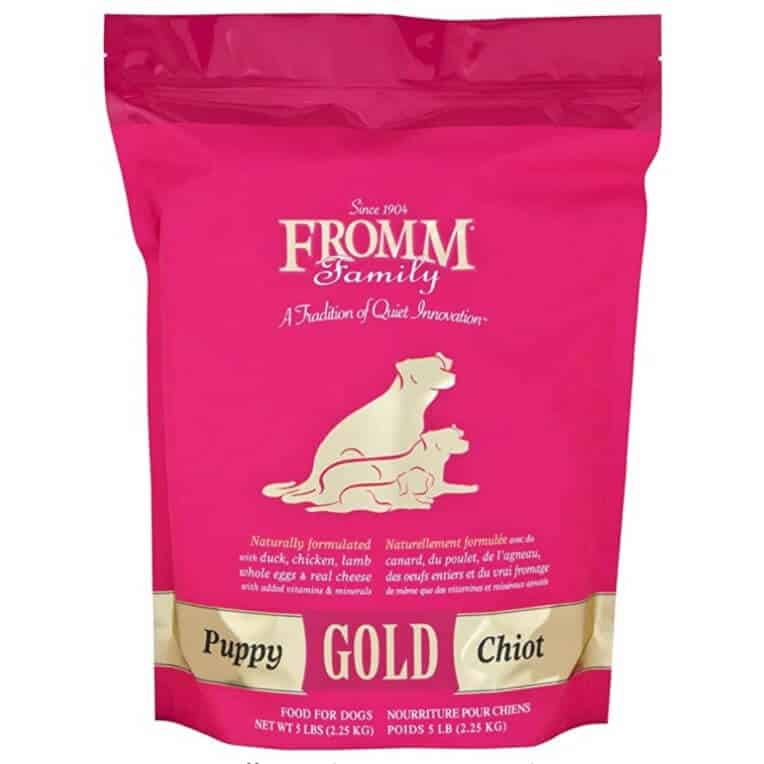
Find the Best Deal:
Owners report that their puppies have super shiny coats and their poop quality has drastically improved. This formula contains probiotics and lots of natural fiber from pearled barley, brown rice, dried tomato pomace, and flaxseed. Making this an excellent choice for Yorkipoo puppies who struggle with sensitive tummies. And as the kibbles are smaller in size, your tiny Doodle won’t have any problems when finishing its meal.
Pros
- Contains fiber and probiotics for good digestion.
- Provides an all round support for Yorkipoo puppies and pregnant or nursing mamas.
- Salmon oil for a healthy coat.
- High protein content.
Cons
- A bit on the pricier side, but most owners say it’s worth it.
Victor
The Victor Hi-Pro Plus dry kibble is the perfect choice for super active Yorkipoos. The nutrient-dense formula contains a whopping 88% of protein from meat sources. They use premium-quality beef, chicken, and pork meals for a diverse nutrient profile. As this kibble is formulated for all life stages, it’s also suitable for puppies and pregnant or nursing mothers.
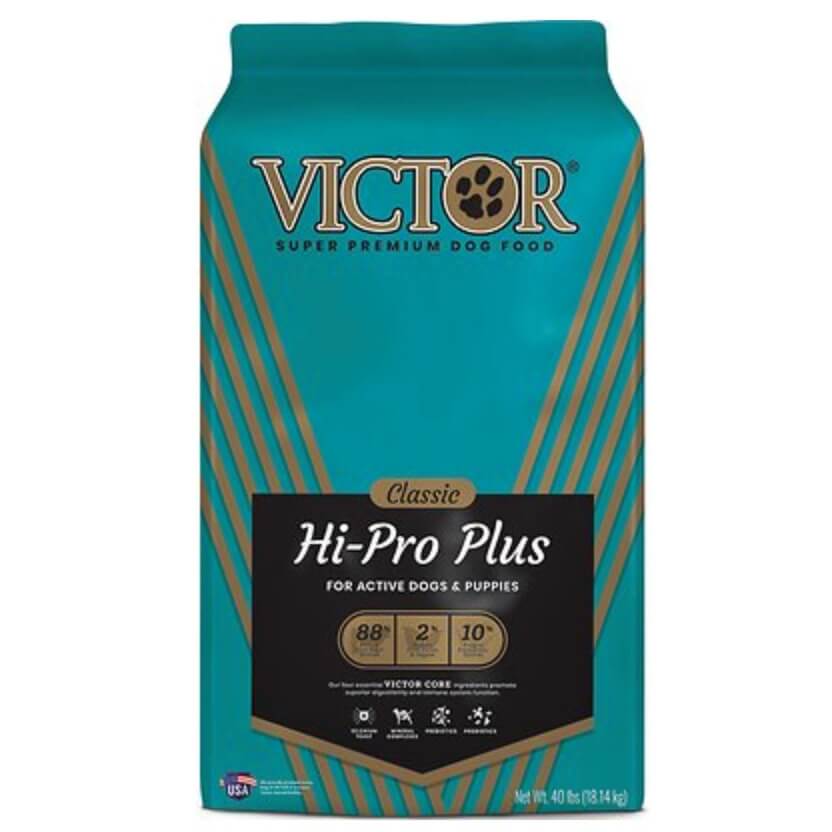
What’s great about the Hi-Pro Plus formula is that it contains their VPRO blend of ingredients, which includes vitamins like A and E for eye health, minerals like calcium and zinc, and supplements to support digestion. Additionally, the menhaden fish meal is a great source of omega-3 fatty acids.
Pros
- Great choice for very active or young Yorkipoos.
- Made with gluten-free grains.
- Nutrient-dense and very high in protein.
- Supports digestion.
Cons
- Another formula that’s higher in calories and not be suitable for less active overweight, or senior dogs.
Hill’s Science Diet
Hill’s Science Diet Adult Sensitive Stomach & Skin Chicken Recipe is probably one of the most recommended dry kibbles by veterinarians. And for a good reason! The formula contains beet pulp, which is a great source of prebiotic fiber. It also has flaxseed, yellow peas, and cracked pearl barley that all provide plenty of fiber your Yorkipoo needs for proper digestion.
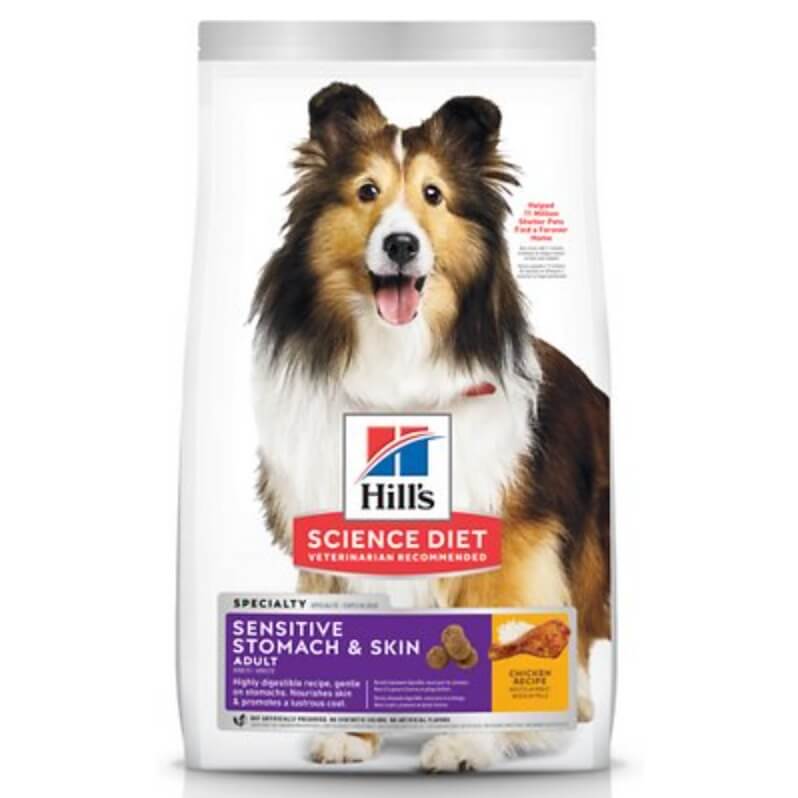
Additionally, the ingredient list includes vitamins A and E, and omega-6 fatty acids that target vision, skin, and coat health. The formula is also fortified with plenty of fruits and veggies like apples, broccoli, cranberries, green peas, and carrots. Along with the beta-carotene, all of these ingredients are perfect for eye health.
Pros
- Biology-based formulas that are recommended by veterinarians.
- Contains fiber from different natural sources for good gut health.
- Supports eye health and vision.
- Uses lots of natural ingredients.
Cons
- Contains chicken, which might cause issues for allergic or sensitive dogs.
Royal Canin
The Royal Canin Hydrolyzed Protein Adult HP is a veterinary-exclusive dry kibble, which means that you’ll only be able to purchase it with a prescription. Although this makes it slightly harder to get your hands on, it’s well worth the trouble. This formula has shown to be amazing for dogs who suffer with skin and stomach issues. The hydrolyzed protein has already been broken down so it’s easier digested. This process helps reduce the risk of triggering any negative reactions or allergies.
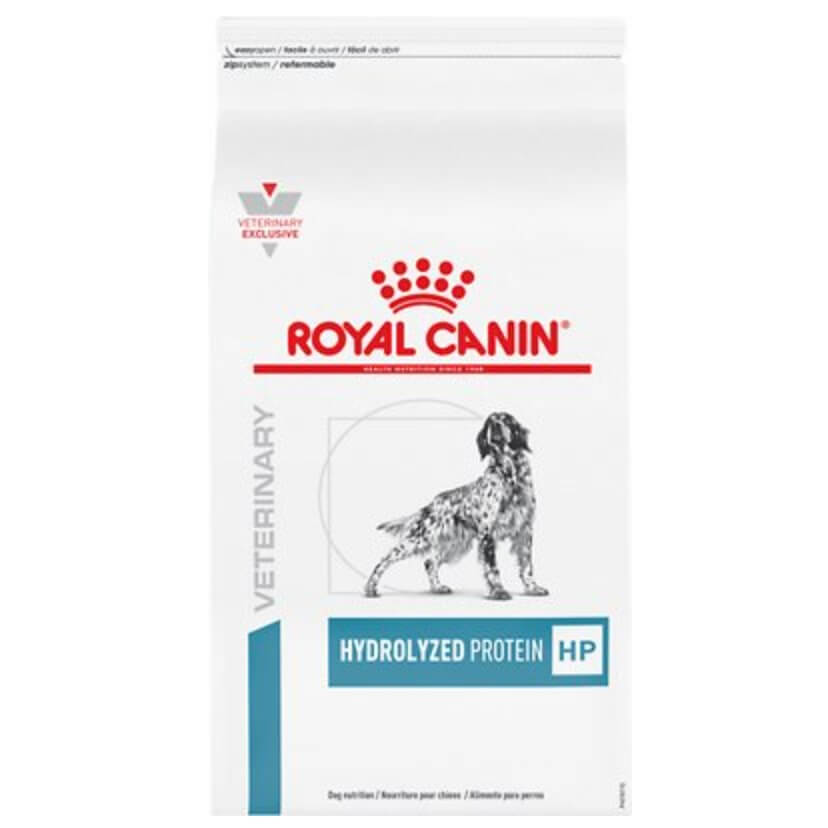
Additionally, the formula includes a blend of fibers and probiotics to support the digestion. It also features vitamins A and E, which are great for vision. Another great thing to note is that the formula contains omega-3 fatty acids EPA and DHA that take care of your Yorkipoo’s skin and coat. It also has B vitamins and amino acids that protect your pup’s skin barrier.
Pros
- Excellent choice for dogs who have allergies and sensitivities.
- Contains omega-3 fatty acids.
- Probiotics and fiber to aid digestion.
- Helps with allergy symptoms on the skin.
Cons
- Might be more expensive, as it is a prescription formula.
Diamond
Diamond Naturals Small Breed Adult Lamb & Rice Formula dry dog food is made with pasture-raised lamb, superfoods, and probiotics. This natural formula includes real, natural ingredients like beet pulp, flaxseed, chia seed, pumpkin, blueberries, spinach, carrots, and many more. The list is really extensive! Not only do all of these natural ingredients provide your dog plenty of antioxidants that support the vision, they’re also packed with fiber.
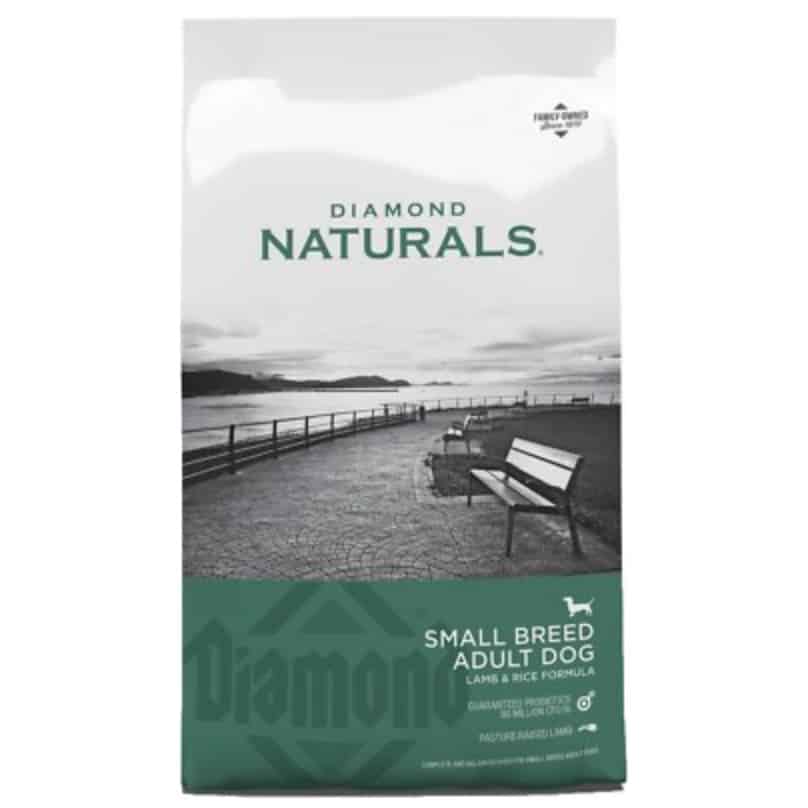
What we love about this formula is that it also contains plenty of omega-3 and omega-6 fatty acids for the skin, hair, and eyes. The first ingredient listed is lamb, and there’s no corn, wheat, fillers, artificial colors, flavors, or preservatives.
Pros
- Contains a proprietary probiotic technology.
- Lots of real fruits and vegetables.
- Supports the digestion.
- Uses pasture-raised lamb.
Cons
- Contains chicken fat and dried yeast, which might trigger allergies in some dogs.
Raw/Homemade Food
Popular alternatives to commercial options are raw and homemade dog foods. Many Doodle owners praise how this approach has helped with their dog’s neverending digestive issues or skin problems. And both of these options have their upsides. Mainly, if your Yorkipoo needs to go on an elimination diet due to allergies or sensitivities, it might be easier to figure out the culprit with homemade dog food. Of course, raw and homemade dog food both provide you better control over the ingredients. You can choose the best human-grade meats, veggies and fruits that are packed with nutrients.
Here you can check out our article about raw dog food benefits, risks, and key ingredients.
However, commercial dog food brands add vitamins, minerals, and other supplements for a reason. Providing a perfectly balanced nutrient profile at home is challenging. Your dog most likely needs additional vitamins and minerals. And if they have digestive issues, some probiotics and fiber as well. If you choose to prepare your dog’s meals at home, check out the AKC’s do’s and don’ts of homemade dog food.
Pros
- Real, natural ingredients.
- You control exactly what goes into your dog’s food.
- No artificial preservatives, colors, or flavors.
Cons
- Time consuming.
- Difficult to provide all the essential nutrients.
- Risk of contamination.
Kirkland
The Kirkland Signature Small Formula is specially designed for small breeds like the Yorkipoo. It uses fresh chicken and a wide selection of fruits and vegetables. Ingredients like carrots, apples, vitamins A and E support your dog’s vision. Meanwhile, the formula includes prebiotics, probiotics, and plenty of fiber that are all essential for pups who struggle with digestive problems.
Pros
- Contains plenty of prebiotics, probiotics, and fiber for good digestion.
- Lots of fruits and veggies.
- Fresh chicken listed as the first ingredient.
- Formulated with omega-3 fatty acids.
Cons
- Although chicken is a great source of protein, it might not be suitable for all Yorkipoos.
Yorkie Poo Feeding Chart
As we already mentioned, how much you feed your dog is just as important as what you feed them. In addition to providing your furry pal good quality food, enforce a proper feeding schedule and stick to the recommended amounts for your Yorkipoo.
Here’s a dog feeding chart for adults:
And here’s a puppy daily feeding chart:
Be sure to check out our dog and puppy food calculator. Use this simple tool to calculate your Yorkipoo’s daily calorie requirements, and easily convert calories into cups of dry dog food per day.
Best Food For Yorkipoo: FAQs
You can calculate how much you should feed your Yorkipoo based on its age and weight. The feeding charts we showed above help you figure out exactly how much you should feed your dog. Here you can learn more about how much you should feed your dog. Keep in mind that under or overfeeding can seriously damage your pup’s health.
Like most dogs, Yorkipoos could eat almost anything. However, we recommend you feed your Yorkipoo a good quality dog food formula that has a balanced nutrient profile and uses high quality ingredients. Their diet should consist of quality proteins, carbs, fats, fruits and veggies, vitamins, and minerals.
Although usually they’re regarded as healthy dogs, Yorkipoos are at a risk of a number of health problems. Most commonly these are allergies, sensitivities, eye problems, joint problems, obesity, or sometimes endocrine problems. Luckily, many of them can be managed with the correct food and lifestyle choices. For example, if your Yorkipoo is suffering from joint issues, opt for formulas containing supplements like glucosamine, chondroitin, and lots of omega fatty acids. Or if your dog has a more sensitive digestion, look for targeted support with ingredients like fiber, probiotics, and prebiotics.
Absolutely! Yorkipoos can eat rice, as long as their whole diet is nutritionally balanced and provides them with all the essential micro- and macronutrients. Rice is a great alternative for pups who are sensitive to other grains like wheat, for example. Rice water is also often used as a remedy when a dog has diarrhea or vomiting.
We hope this article helps you narrow down on the many dog foods available on the market today. Even though it can seem a daunting task, you’ll have a much easier time choosing the best dog food for Yorkipoo when you know what to look for.
Learn How to Care for Your Doodle Puppy!

Perfect for first-time Doodle parents, get ALL your questions answered, including questions new Doodle parents don’t even think to ask.
Plus, get $700 worth of Bonus Materials for FREE, including:- Doodle Parenthood Community and Support Group ($190 value)
- Doodle Puppy Growth Tracker ($20 value)
- EMERGENCY Cheatsheet: When To Call The Vet Immediately ($50 value)
- HELP! Button ($145 value)
- And SO MUCH MORE!
The information on this page is for informational purposes only. It is not intended to be a substitute for qualified professional veterinary advice, diagnosis, or treatment. Always seek the advice of your veterinarian or other qualified animal health provider with any questions you may have.

